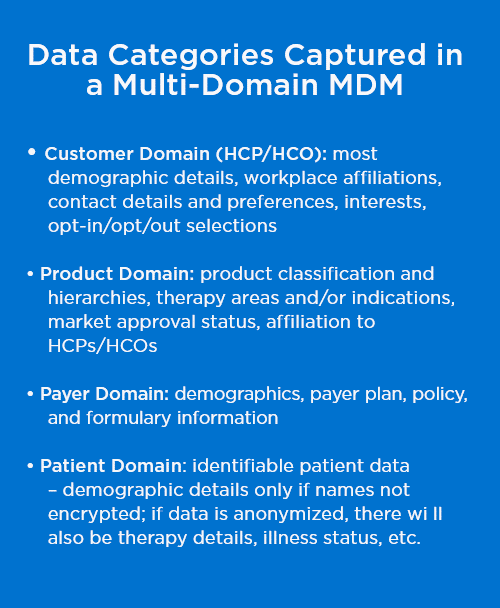Turn on a Dime with a Responsive Master Data Strategy

Master Data Management in the Time of COVID-19
In coping with the COVID-19 pandemic, the medical community has had to adapt to a fluid situation. New scientific information is published daily. Provider roles shift with changing patient loads. Safety measures are refined frequently. And the preferences and expectations of healthcare professionals (HCPs) and healthcare organizations (HCOs) are in flux. The changes have been swift, pervasive, and relentless.
Does your Master Data Management (MDM) platform allow you to keep pace?
If you’re working with less-than-current information about your customers, products, payers, or patients – you’re apt to base decisions on faulty information. You’ll zig when you should zag, and you’ll miss opportunities. That’s true today, as we adjust to life during a pandemic, and it will be true in the months ahead as new vaccines and therapies are launched into an eager market. Precision and agility need to go hand in hand.
Data is all
In Bernard Cornwell’s historical novels, The Saxon Tales, the main character claims “destiny is all.” Today, we could make the case that “data is all.” Data – more than algorithms and analytical advances – is a company’s most valuable asset. After all, a company’s investment in artificial intelligence (AI) and machine learning (ML) will be wasted unless the foundational data is integrated, comprehensive, accurate, and relevant.
So, let’s talk about how your data management solution should be ensuring that your data is current and accessible to all those who depend on it – users in marketing, sales, operations, and compliance/regulatory.
Start with a contextualized, golden record
Initially, the goal of legacy MDM systems was to create a “golden record,” a single source of the “truth” for a specific piece of information about a product, person, or organization – for example, the address in a physician profile. Data coming in from multiple systems was matched, merged, and cleaned to produce a pristine record representing the best and most accurate details available. All systems across the enterprise were then overwritten with that golden record to prevent discrepancies.
Today, the most effective approach is to build a reliable foundation of 360-degree profiles across customers, products, payers, and patients. Beyond what golden records offer, these profiles include relationship information, omnichannel interactions and transactions, and relevant insights with intelligent recommendations. However, only the elements of that record that can be accepted by another system or that make sense to distribute, are sent downstream. Users access contextual views of the data that are relevant to their role in the organization or to their business objective. As an example, a customer’s address used by marketing may be different than that used by order management, and that used by finance may be different still.
Take a multi-domain approach 
In the past, companies relied on separate MDM systems for customer data, product data, organizational data, and finance data, etc. Today, as business processes are more integrated, best-in-class data management systems integrate all of those domains in one system with as many as a thousand attributes for each entity and uncover relationships across those domains. AI and ML are used to provide not only additional insights for each profile, but also to improve data quality through better data matching, and quality scoring, etc. Such comprehensive master data is essential to executing an effective go-to-market strategy, segmenting and targeting customers, aligning territories and market definitions, and optimizing the supply chain.
Specifically, with respect to your go-to-market strategy, a multi-domain master data management platform will support:
- Orchestrated messaging and engagement. You will finally be able to gather a centralized, complete view of all stakeholders, including their preferences and interests. Sales and marketing departments will understand how each customer interacts with the whole company, insight vital to personalizing relationships, and driving the perfect multichannel approach.
- Increased sales ops efficiency. All the processes that require data management – from collection to stewardship and distribution – can be performed quickly with reduced manual errors.
- Improved compliance. With visibility to all transactions related to a unique HCP at the country/region/global levels, you can confirm sample eligibility and monitor regulatory compliance. And with a central platform that collates opt-in/out details, you can comply with privacy requirements such as GDPR.
Choose a system that prioritizes responsiveness
The COVID-19 pandemic has intensified the need to have a flexible approach to master data management with system features that allow for easy updates, course changes, and fluctuating demand. Your master data management platform should support your ability to pivot quickly and hyper-personalize your commercial approach. A responsive master data management platform, such as Reltio for IQVIA MDM Solutions, will boost your responsiveness across several fronts:
- Organizational agility. With the digitization of sales calls and changes in the HCP community, you may need to realign your sales structure. And your sales alignments will change yet again when COVID-19 vaccines and new treatments hit the market. Your master data management platform should have flexible hierarchy management – with visualizations – so that you can maintain several hierarchies for different purposes and teams. It should also be able to ingest and distribute any update rapidly so that you can respond quickly to market changes.
- Regulatory changes. Life Sciences is already one of the most regulated industries, but new guidelines or changes to existing ones continue to be developed. Each change may call for the collection, maintenance, and/or reporting of specific information in a defined format. Your data management system must support configurable workflows and granular audit trails to simplify meeting these regulatory needs. With a flexible and agile MDM model at the core of data orchestration, you can avoid potential fines or delays in compliance processes that may have other financial impact (e.g., delay in market approval).
- Fluctuating capacity. Your system’s computing power and storage needs will fluctuate with market conditions, as seasons change, as products launch, or as approvals are delayed. With a cloud-native solution, you can scale your infrastructure as needed.
Conclusion
The COVID-19 pandemic has accelerated the pace of change in the market, but it’s nothing that a next-generation responsive master data management can’t handle. With data available in real time and integrated from across the enterprise, you can respond with informed decisions based on accurate, coherent, and complete data.
About IQVIA
IQVIA is the leading global provider of advanced analytics, technology solutions, and clinical research services to the life sciences industry. Reltio and IQVIA are strategic partners in developing innovative solutions to help your organization handle the increasingly complex information needed to make effective business decisions. For information about IQVIA’s MDM Solution, please visit IQVIA Technologies
